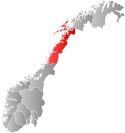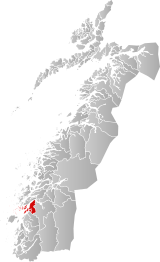Tjøtta is a former municipality in Nordland county, Norway. The 326-square-kilometre (126 sq mi) municipality existed from 1862 until its dissolution in 1965. The municipality was centered around the island of Tjøtta plus the mainland to the east and south as well as over 3000 islands, islets, and skerries to the west. The administrative centre of Tjøtta was the village of Tjøtta, located on the island of Tjøtta, where the Tjøtta Church is located.[6][7]
Tjøtta Municipality
Tjøtta herred | |
|---|---|
 Nordland within Norway | |
 Tjøtta within Nordland | |
| Coordinates: 65°50′19″N 12°27′15″E / 65.8386°N 12.4542°E | |
| Country | Norway |
| County | Nordland |
| District | Helgeland |
| Established | 1862 |
| • Preceded by | Alstahaug Municipality |
| Disestablished | 1 Jan 1965 |
| • Succeeded by | Alstahaug Municipality and Vega Municipality |
| Administrative centre | Tjøtta |
| Government | |
| • Mayor (1963-1965) | Petter J. Liland (Ap) |
| Area (upon dissolution) | |
| • Total | 326.3 km2 (126.0 sq mi) |
| • Rank | #262 in Norway |
| Highest elevation | 755 m (2,477 ft) |
| Population (1964) | |
| • Total | 1,747 |
| • Rank | #423 in Norway |
| • Density | 5.4/km2 (14/sq mi) |
| • Change (10 years) | |
| Demonym | Tjøttværing[2] |
| Official language | |
| • Norwegian form | Neutral[3] |
| Time zone | UTC+01:00 (CET) |
| • Summer (DST) | UTC+02:00 (CEST) |
| ISO 3166 code | NO-1817[5] |
Prior to its dissolution in 1965, the 326-square-kilometre (126 sq mi) municipality was the 262nd largest by area out of the 525 municipalities in Norway. Tjøtta Municipality was the 423rd most populous municipality in Norway with a population of about 1,747. The municipality's population density was 5.4 inhabitants per square kilometre (14/sq mi) and its population had decreased by 21% over the previous 10-year period.[8][9]
General information
editThe municipality of Tjøtta was established in 1862 when it was separated from Alstahaug Municipality. Initially, Tjøtta Municipality had a population of 2,781. On 1 July 1917, the southeastern district of Tjøtta Municipality (population: 1,097) was separated to become the new Vevelstad Municipality, leaving Tjøtta with 2,287 inhabitants. On 1 July 1920 the Giskåen farm with 10 inhabitants was transferred to Vevelstad Municipality.[10]
During the 1960s, there were many municipal mergers across Norway due to the work of the Schei Committee. On 1 January 1964, the part of Tjøtta Municipality located on the eastern part of the island of Alsta (population: 180) was incorporated into Leirfjord Municipality. On 1 January 1965, the Skogsholmen island area in western Tjøtta (population: 196) was incorporated into Vega Municipality. The rest of Tjøtta Municipality (population: 1,477) was merged with most of Alstahaug Municipality (population: 920) and the town of Sandnessjøen (population: 3,856) to form a new, larger Alstahaug Municipality.[10]
Name
editThe municipality (originally the parish) is named after the old Tjøtta farm (Old Norse: Þjótta) since the first Tjøtta Church was built there. The name of the farm (and the island on which it is located) comes from the word þjó which is a noun describing the "upper part of a thigh". The name was likely used to refer to the shape of the island.[11][12]
Churches
editThe Church of Norway had one parish (sokn) within Tjøtta Municipality. At the time of the municipal dissolution, it was part of the Tjøtta prestegjeld and the Nord-Helgeland prosti (deanery) in the Diocese of Sør-Hålogaland.[9]
| Parish (sokn) | Church name | Location of the church | Year built |
|---|---|---|---|
| Tjøtta | Tjøtta Church | Tjøtta | 1867 |
| Skålvær Church | Skålværet | 1851 |
Geography
editThe highest point in the municipality was the 755-metre (2,477 ft) tall mountain Valtinden, on the border with Vefsn Municipality.[1]
Government
editWhile it existed, Tjøtta Municipality was responsible for primary education (through 10th grade), outpatient health services, senior citizen services, welfare and other social services, zoning, economic development, and municipal roads and utilities. The municipality was governed by a municipal council of directly elected representatives. The mayor was indirectly elected by a vote of the municipal council.[13] The municipality was under the jurisdiction of the Hålogaland Court of Appeal.
Municipal council
editThe municipal council (Herredsstyre) of Tjøtta was made up of 17 representatives that were elected to four year terms. The tables below show the historical composition of the council by political party.
| Party name (in Norwegian) | Number of representatives | |
|---|---|---|
| Labour Party (Arbeiderpartiet) | 8 | |
| Liberal Party (Venstre) | 3 | |
| List of workers, fishermen, and small farmholders (Arbeidere, fiskere, småbrukere liste) | 2 | |
| Joint List(s) of Non-Socialist Parties (Borgerlige Felleslister) | 4 | |
| Total number of members: | 17 | |
| Note: On 1 January 1965, Tjøtta Municipality was dissolved and its lands became part of Alstahaug Municipality and Vega Municipality. | ||
| Party name (in Norwegian) | Number of representatives | |
|---|---|---|
| Labour Party (Arbeiderpartiet) | 6 | |
| Conservative Party (Høyre) | 1 | |
| Liberal Party (Venstre) | 2 | |
| Local List(s) (Lokale lister) | 8 | |
| Total number of members: | 17 | |
| Party name (in Norwegian) | Number of representatives | |
|---|---|---|
| Labour Party (Arbeiderpartiet) | 5 | |
| Liberal Party (Venstre) | 1 | |
| Joint List(s) of Non-Socialist Parties (Borgerlige Felleslister) | 8 | |
| Local List(s) (Lokale lister) | 3 | |
| Total number of members: | 17 | |
| Party name (in Norwegian) | Number of representatives | |
|---|---|---|
| Labour Party (Arbeiderpartiet) | 5 | |
| Conservative Party (Høyre) | 1 | |
| Liberal Party (Venstre) | 3 | |
| Local List(s) (Lokale lister) | 7 | |
| Total number of members: | 16 | |
| Party name (in Norwegian) | Number of representatives | |
|---|---|---|
| Labour Party (Arbeiderpartiet) | 3 | |
| Liberal Party (Venstre) | 3 | |
| List of workers, fishermen, and small farmholders (Arbeidere, fiskere, småbrukere liste) | 3 | |
| Joint List(s) of Non-Socialist Parties (Borgerlige Felleslister) | 3 | |
| Local List(s) (Lokale lister) | 4 | |
| Total number of members: | 16 | |
| Party name (in Norwegian) | Number of representatives | |
|---|---|---|
| Labour Party (Arbeiderpartiet) | 4 | |
| List of workers, fishermen, and small farmholders (Arbeidere, fiskere, småbrukere liste) | 4 | |
| Local List(s) (Lokale lister) | 8 | |
| Total number of members: | 16 | |
| Party name (in Norwegian) | Number of representatives | |
|---|---|---|
| Labour Party (Arbeiderpartiet) | 5 | |
| Local List(s) (Lokale lister) | 11 | |
| Total number of members: | 16 | |
| Note: Due to the German occupation of Norway during World War II, no elections were held for new municipal councils until after the war ended in 1945. | ||
Mayors
editThe mayor (Norwegian: ordfører) of Tjøtta was the political leader of the municipality and the chairperson of the municipal council. Here is a list of people who held this position (incomplete list):
- 1889-1902: J.M.G. Hansen[21]
- 1902-1920: Ole E. Paasche[22]
- 1920-1922: J.M.G. Hansen[21]
- 1923-1926: Ole E. Paasche[23]
- 1926-1940: Johan A. Myklebost[24]
- 1940-1941: J.B. Jakobsen[25]
- 1941-1943: Leiv Eikeland[26]
- 1943-1944: Jørgen Bang[27]
- 1945-1945: Olav Andreassen[28]
- 1945-1947: Petter Olav Johnsen Liland (Ap)[29]
- 1947-1951: Olav Andreassen[30]
- 1951-1955: Petter Olav Johnsen Liland (Ap)[29]
- 1955-1959: Johan Arnt Myklebost[31]
- 1959-1959: Andreas Lisøy
- 1959-1963: Erling Flokkmann[32]
- 1963-1965: Petter Olav Johnsen Liland (Ap)[33]
Media gallery
edit-
Tjøtta is located on Strandflaten lowland near the sea
-
Tjøtta gard, the old Tjøtta farm now the site of a guesthouse
-
Tjøtta kyrkje, Tjøtta Church
See also
editReferences
edit- ^ a b "Kart" (in Norwegian). Kartverket. 16 January 2024.
- ^ "Navn på steder og personer: Innbyggjarnamn" (in Norwegian). Språkrådet.
- ^ "Norsk Lovtidende. 2den Afdeling. 1932. Samling af Love, Resolutioner m.m". Norsk Lovtidend (in Norwegian). Oslo, Norway: Grøndahl og Søns Boktrykkeri: 453–471. 1932.
- ^ "Forskrift om målvedtak i kommunar og fylkeskommunar" (in Norwegian). Lovdata.no.
- ^ Bolstad, Erik; Thorsnæs, Geir, eds. (26 January 2023). "Kommunenummer". Store norske leksikon (in Norwegian). Kunnskapsforlaget.
- ^ Thorsnæs, Geir, ed. (16 May 2016). "Tjøtta – tidligere kommune". Store norske leksikon (in Norwegian). Kunnskapsforlaget. Retrieved 20 September 2018.
- ^ Helland, Amund (1908). "Tjøtta herred". Norges land og folk: Nordlands amt (in Norwegian). Vol. XVIII. Kristiania, Norway: H. Aschehoug & Company. p. 172. Retrieved 20 September 2018.
- ^ Statistisk sentralbyrå. "Table: 06913: Population 1 January and population changes during the calendar year (M)" (in Norwegian).
- ^ a b Statistisk sentralbyrå (1 January 1951). Norges Sivile, Geistlige, Rettslige og Militære Inndeling 1. Januar 1951 (PDF). Norges Offisielle Statistikk (in Norwegian). Oslo, Norge: H. Aschehoug & Co.
- ^ a b Jukvam, Dag (1999). "Historisk oversikt over endringer i kommune- og fylkesinndelingen" (PDF) (in Norwegian). Statistisk sentralbyrå. ISBN 9788253746845.
- ^ Rygh, Oluf (1905). Norske gaardnavne: Nordlands amt (in Norwegian) (16 ed.). Kristiania, Norge: W. C. Fabritius & sønners bogtrikkeri.
- ^ Thorsnæs, Geir, ed. (24 March 2020). "Tjøtta – øy". Store norske leksikon (in Norwegian). Kunnskapsforlaget. Retrieved 11 March 2023.
- ^ Hansen, Tore; Vabo, Signy Irene, eds. (20 September 2022). "kommunestyre". Store norske leksikon (in Norwegian). Kunnskapsforlaget. Retrieved 14 October 2022.
- ^ "Kommunevalgene 1963" (PDF) (in Norwegian). Oslo: Statistisk sentralbyrå. 1964. Retrieved 18 March 2020.
- ^ "Kommunevalgene og Ordførervalgene 1959" (PDF) (in Norwegian). Oslo: Statistisk sentralbyrå. 1960. Retrieved 18 March 2020.
- ^ "Kommunevalgene og Ordførervalgene 1955" (PDF) (in Norwegian). Oslo: Statistisk sentralbyrå. 1957. Retrieved 18 March 2020.
- ^ "Kommunevalgene og Ordførervalgene 1951" (PDF) (in Norwegian). Oslo: Statistisk sentralbyrå. 1952. Retrieved 18 March 2020.
- ^ "Kommunevalgene og Ordførervalgene 1947" (PDF) (in Norwegian). Oslo: Statistisk sentralbyrå. 1948. Retrieved 18 March 2020.
- ^ "Kommunevalgene og Ordførervalgene 1945" (PDF) (in Norwegian). Oslo: Statistisk sentralbyrå. 1947. Retrieved 18 March 2020.
- ^ "Kommunevalgene og Ordførervalgene 1937" (PDF) (in Norwegian). Oslo: Statistisk sentralbyrå. 1938. Retrieved 18 March 2020.
- ^ a b "Noen minneord". Helgelands Blad (in Norwegian). 13 April 1944. p. 2. Retrieved 12 October 2024.
- ^ "Tjøtta". Nordland (in Norwegian). 17 May 1902. p. 2. Retrieved 12 October 2024.
- ^ "Tjøtta herredstyre". Helgelands Blad (in Norwegian). 4 January 1924. p. 1. Retrieved 12 October 2024.
- ^ "De nye ordførere i Nordland fylke". Nordlandsposten (in Norwegian). 18 February 1935. p. 2. Retrieved 6 August 2024.
- ^ "De nye ordførere og varaordførere i Nordland opnevnt". Lofotposten (in Norwegian). 16 January 1941. pp. 1 & 6. Retrieved 6 August 2024.
- ^ "Nye ordførere og varaordførere i Nordland fylke". Nordlandsposten (in Norwegian). 5 January 1943. p. 4. Retrieved 6 August 2024.
- ^ "Som ordfører i Tjøtta". Helgelands Blad (in Norwegian). 23 March 1943. p. 2. Retrieved 12 October 2024.
- ^ "De nye, midlertidige ordførere i Nordland og Troms". Lofotposten (in Norwegian). 14 May 1945. p. 6. Retrieved 6 August 2024.
- ^ a b "Petter O. Johnsen Liland" (in Norwegian). Storting. Retrieved 12 October 2024.
- ^ "18 nye ordførere i Nordland". Nordlandsposten (in Norwegian). 16 January 1948. p. 2. Retrieved 15 August 2024.
- ^ "Ordførervalg i Nordland". Nordlands Framtid (in Norwegian). 28 December 1955. p. 4. Retrieved 12 October 2024.
- ^ "Ny ordfører i Tjøtta". Nordlands Avis (in Norwegian). 28 December 1959. p. 1. Retrieved 12 October 2024.
- ^ "Petter J. Liland ordfører i Tjøtta". Rana Blad (in Norwegian). 7 December 1963. p. 8. Retrieved 12 October 2024.